Decoding Google Business Profile Suspensions: Key Factors Leading to Google Business Profile Suspension Instances
Maintaining a robust online presence through your Google Business Profile (GBP) is vital for the success of your business. However, there are specific factors that can lead to Google Business Profile Suspension, impacting your online visibility and credibility.
In this article, we will delve into the primary reasons that may result in Google Business Profile Suspensions and explore strategies to navigate and prevent such instances.
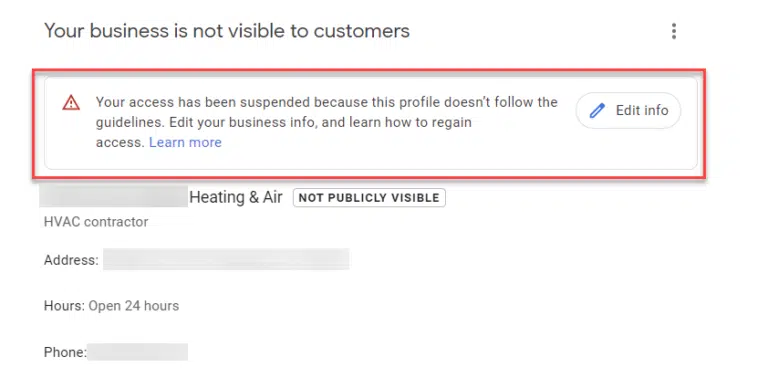
Address is a PO Box, UPS Mail Store, Virtual Office, or Other False Address
A leading cause of Google Business Profile Suspensions is the provision of false or inaccurate information. Upholding transparency is essential, and any attempt to misrepresent your business details, including location, contact information, or offered services, can trigger Google Business Profile Suspensions.
Google enforces strict guidelines regarding the eligibility of addresses for Google Business Profiles. Some of the most commonly violated rules pertain to the use of:
- A P.O. Box address.
- A UPS Box address.
- An address associated with a virtual office or co-working space.
It's important to note that none of these types of addresses are permitted. However, there is a rare exception for a co-working space address, provided you satisfy the following criteria:
- You rent a dedicated office within the co-working space.
- The location features permanent signage.
- You are able to meet with customers at this location.
- The office is consistently staffed during business hours. This means either you or your employees must be present. It's worth mentioning that co-working staff do not qualify as your employees in this context.
Examples to illustrate the proper and improper use of addresses for Google Business Profiles
| Proper Use of Dedicated Office in a Co-Working Space: | Improper Use of UPS Box Address: |
|---|---|
| Meet Alex, a startup entrepreneur running a digital marketing agency. To establish a professional business presence, Alex rents a dedicated office within a co-working space that caters to businesses. His office features clear and permanent signage, allowing clients to easily locate his business. Alex conducts client meetings at his co-working space, and he ensures that either he or his team is present during business hours to provide assistance. In this case, Alex's utilization of a co-working space address aligns with Google's guidelines. | Consider Emily, a small e-commerce business owner. In an attempt to separate her business mail from personal mail, Emily decides to use a UPS Box address as the location for her Google Business Profile. However, this violates Google's guidelines, as the use of UPS Box addresses is not allowed. Unlike a physical office, a UPS Box lacks the necessary criteria for a valid business address, such as a dedicated space and the ability to meet with clients. Emily's choice of a UPS Box address would lead to non-compliance with Google's address guidelines. |
| Proper Use of Co-Working Space Address: | Improper Use of Virtual Office Address: |
|---|---|
| Meet Sarah, a freelance graphic designer. She decided to rent a dedicated office space within a reputable co-working facility. Sarah ensures her office has permanent signage, making it easily identifiable. She uses this co-working space to meet with clients, and either she or her assistant is always present during business hours to attend to any inquiries. In this scenario, Sarah's use of a co-working space address aligns with Google's guidelines. | Now, let's consider John, a small business owner. Seeking a prestigious business address, John subscribes to a virtual office service without having a physical office. He lists this virtual office address on his Google Business Profile, despite not meeting the necessary criteria. John does not have a dedicated office space, lacks permanent signage, and cannot meet clients at this address. Consequently, John's use of a virtual office address violates Google's guidelines. |
Reports of Violations on your GBP
User reports play a crucial role in identifying and addressing policy violations. Receiving multiple reports of misconduct, such as spamming, offensive content, or fraudulent activities, heightens the likelihood of Google Business Profile Suspensions.
Regularly monitor and promptly address customer feedback to maintain a positive online reputation.
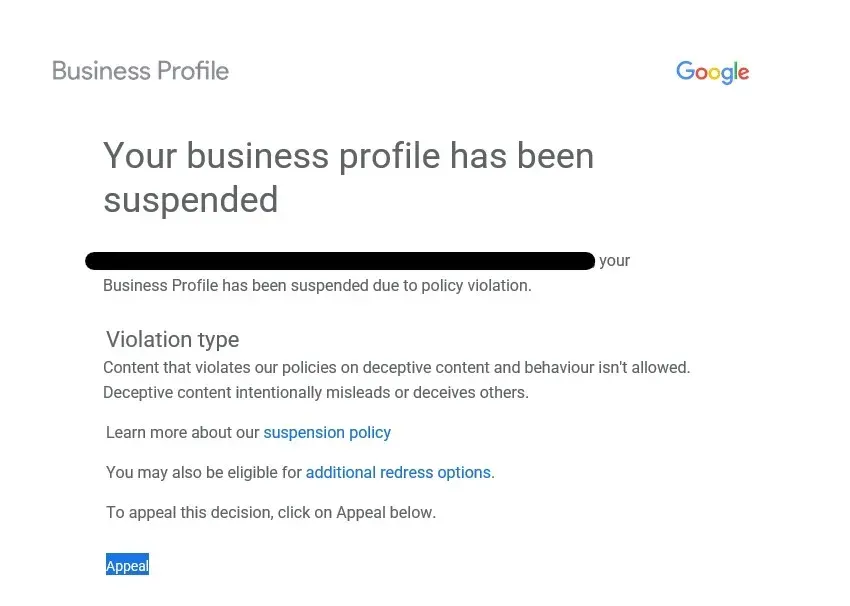
Association of GBP account with other suppressed listings
Associating your business with other listings that have faced suppression or penalties can negatively impact your GBP. Google aims to provide trustworthy information, and any connection with compromised listings may lead to Google Business Profile Suspensions. Keep your business associations clean and reputable.

Reports of Review Gating
Reports of manipulating reviews through review gating can lead to Google Business Profile Suspension. It is essential to encourage honest reviews and avoid any practices that manipulate or selectively filter them.
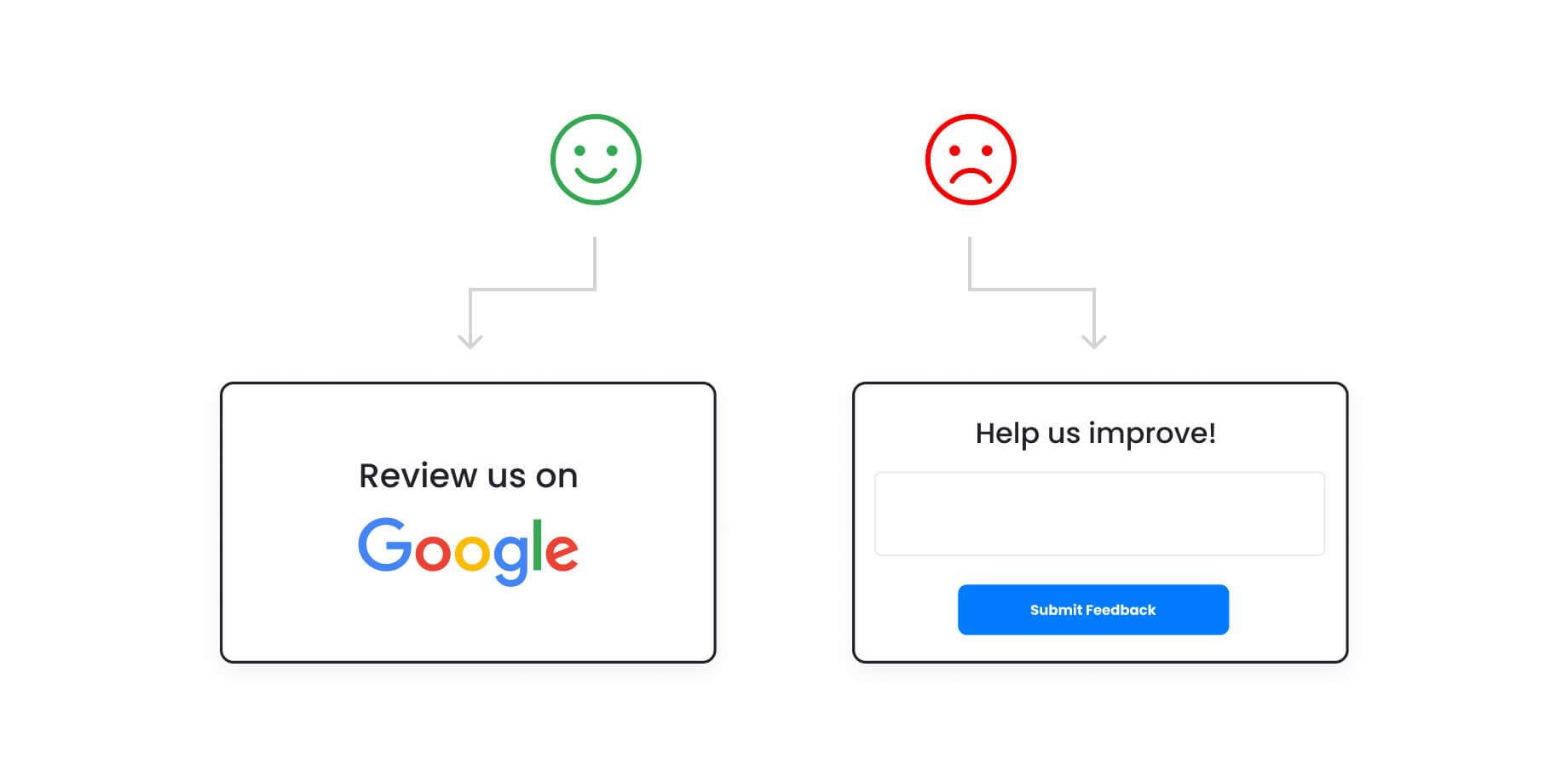
What is Review Gating? Here's an Review Gating Example
Let's consider a home service business owner named Alex who specializes in plumbing. Alex, eager to enhance the online reputation of his business, decides to implement a strategy known as "Review Gating."
After completing a plumbing service for a homeowner, Alex follows up with a thank-you email or text expressing gratitude for choosing his plumbing services. In this message, Alex presents two distinct options for the customer:
- Option A: "If you were satisfied with our plumbing services, please click here to leave a review on Google."
- Option B: "If you encountered any issues or have concerns, please share your feedback with us privately by clicking here."
In this way, Alex is employing Review Gating by directing customers with positive experiences to leave public reviews on his Google Business Profile while redirecting customers with potential negative feedback to an internal feedback system.
However, it's crucial to note that Google explicitly discourages Review Gating as it goes against their policies. Google emphasizes creating an open and unbiased space for customers to share their experiences, irrespective of whether the feedback is positive or negative. Violating these guidelines may result in consequences, such as the suspension of the Google Business Profile. Businesses are encouraged to seek genuine, unfiltered feedback to maintain transparency and credibility online.
Site Hacked / Presence of Malware
Security threats, such as a hacked website or the presence of malware, pose significant risks to users. Google takes such threats seriously, and if your GBP is associated with a compromised site, it may result in Google Business Profile Suspensions. Regularly update and secure your website to mitigate security risks.
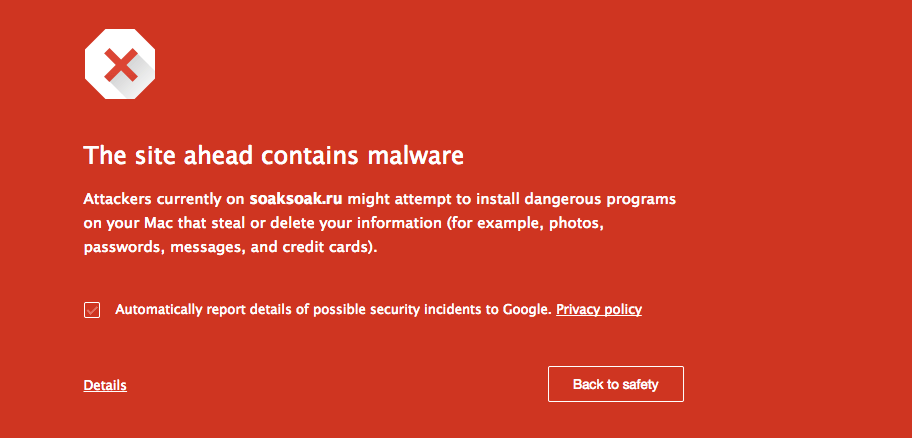
Presence of Other Profiles in the Same Category at the Same Address
Having multiple business profiles in the same category at the same address may violate Google's guidelines, potentially resulting in Google Business Profile Suspension. Ensure clarity and uniqueness in your business representation.
Google generally frowns upon businesses sharing the same address or phone number, with exceptions made for situations like office buildings, malls, or car dealerships with separate service or car repair businesses.
This rule is primarily in place to prevent scenarios such as:
- home-based businesses creating multiple Business Profiles at their home address
- a single business establishing more than one business at a single location.
A recent case on the Google Business Profile Help Forum highlighted this issue. A landscaper had set up a Google Business Profile for his landscaping business, operated from his home. Subsequently, he created another profile for a seemingly separate venture - a sod-laying business. However, laying sod is inherently part of landscaping.
He was puzzled as to why the new sod-laying Business Profile got suspended. It became apparent, both to me and to Google, that this individual was attempting to manipulate the system by creating two GBPs at the same address, likely with the aim of boosting his rankings.
A more appropriate approach would have been to add "sod supplier" as a category to his existing landscaping Business Profile.
Google's intention is to discourage the practice of setting up multiple Business Profiles to gain higher rankings, aiming for a fair and transparent representation of businesses on the platform.
Reports of Fake Reviews on your GBP
The presence of fake reviews on your GBP can trigger suspension. Ensure that reviews are genuine and reflect real customer experiences to maintain the integrity of your profile.
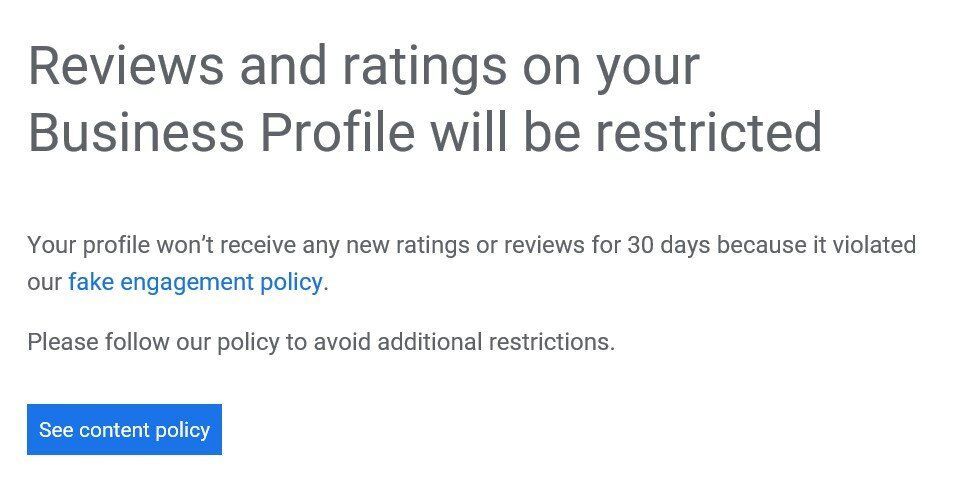
Keyword Stuffing in GBP Business Name
Keyword stuffing in your business name on GBP violates guidelines and can lead to Google Business Profile Suspension. Stick to your actual business name to maintain compliance.
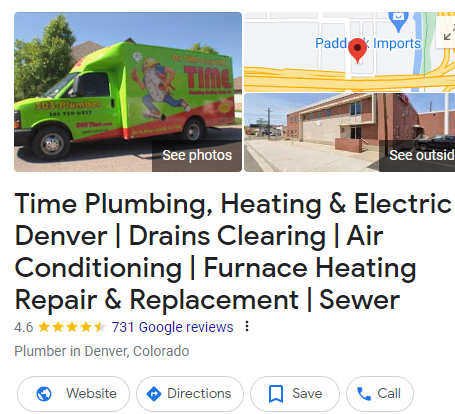
Presence of Multiple Profiles with Same Phone Number
Having multiple profiles with the same phone number may raise concerns and lead to Google Business Profile Suspension. Ensure that each business profile has a unique and valid phone number.
Example of the presence of multiple Google Business Profiles (GBPs) with the same phone number
| Business A: | Business B: |
|---|---|
| Business Name: Alex's HVAC Repair | Business Name: Alex's Plumbing Solutions |
| Phone Number: (555) 789-1234 | Phone Number: (555) 789-1234 |
| Category: Heating, Ventilation, and Air Conditioning | Category: Plumbing Services |
Receiving Too Many Google Reviews Too Fast
Rapidly accumulating reviews may be flagged as suspicious behavior, potentially resulting in Google Business Profile Suspension. Foster a natural pace of reviews to avoid triggering Google's algorithm.
Google Business Profile Suspensions Wrap Up
While maintaining a Google Business Profile is crucial for online visibility, it comes with responsibilities. By avoiding false information, ensuring accuracy, addressing user concerns promptly, and maintaining a secure online presence, you can minimize the risk of Google Business Profile Suspensions.
Additionally, being aware of and steering clear of the mentioned suspension factors will help you safeguard your online reputation effectively. Regularly review and adhere to Google's guidelines to ensure a positive experience for both your business and its customers.




